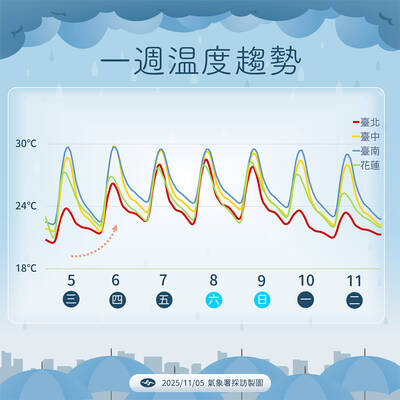Most people support the government probing Taiwanese entertainers for allegedly “amplifying” the Chinese Communist Party’s propaganda, a survey conducted by the Asia-Pacific Elite Interchange Association showed on Friday.
Public support stood at 56.4 percent for action by the Mainland Affairs Council and the Ministry of Culture to enhance scrutiny on Taiwanese performers and artists who have developed careers in China while allegedly adhering to the narrative of Beijing’s propaganda that denigrates or harms Taiwanese sovereignty, the poll showed.
Thirty-three percent did not support the action, it showed.

Photo: Taipei Times
The poll showed that 51.5 percent of respondents supported the government’s investigation into Taiwanese who have Chinese IDs or household registration.
“Overall, Taiwanese support the government taking a tougher stance to combat Chinese infiltration and ‘united front’ work,” the association said in a statement. “Most people want healthy cross-strait conduct based on legal frameworks and mutual respect.”
Asked about President William Lai’s (賴清德) address on Tuesday marking one year since his inauguration — in which he said he would instruct his national security team to initiate “a major national security briefing” for the heads of the opposition parties — 22.7 percent said they had “high support” for his comments, 38.9 percent said they “somewhat support” them, 9,1 percent did not support them, 6.9 percent strongly oppose his comments and 22.5 percent had no opinion, the poll showed.
Asked about comments Lai made in an interview in which he compared China to a big company and Taiwan to a small one, saying that “the big company should make an offer if it wants to acquire the small company,” 20.9 percent were “very supportive” of the comments, 25.7 percent were “somewhat supportive,” 17.9 percent were “not supportive,” 24.7 percent “strongly disagreed” and 10.8 percent had no opinion, it showed.
The poll showed that 46.4 percent approved of Lai’s handling of the cross-strait relationship since he took office, while 44.9 percent disapproved.
The government must consolidate public consensus in the face of China’s escalating intimidation of Taiwan, the association said.
The poll, conducted via landline from Tuesday to Thursday, garnered 1,012 valid responses from people aged 20 or older.
It has a margin of error of 3.08 percentage points.

Three Taiwanese airlines have prohibited passengers from packing Bluetooth earbuds and their charger cases in checked luggage. EVA Air and Uni Air said that Bluetooth earbuds and charger cases are categorized as portable electronic devices, which should be switched off if they are placed in checked luggage based on international aviation safety regulations. They must not be in standby or sleep mode. However, as charging would continue when earbuds are placed in the charger cases, which would contravene international aviation regulations, their cases must be carried as hand luggage, they said. Tigerair Taiwan said that earbud charger cases are equipped

Foreign travelers entering Taiwan on a short layover via Taiwan Taoyuan International Airport are receiving NT$600 gift vouchers from yesterday, the Tourism Administration said, adding that it hopes the incentive would boost tourism consumption at the airport. The program, which allows travelers holding non-Taiwan passports who enter the country during a layover of up to 24 hours to claim a voucher, aims to promote attractions at the airport, the agency said in a statement on Friday. To participate, travelers must sign up on the campaign Web site, the agency said. They can then present their passport and boarding pass for their connecting international

UNILATERAL MOVES: Officials have raised concerns that Beijing could try to exert economic control over Kinmen in a key development plan next year The Civil Aviation Administration (CAA) yesterday said that China has so far failed to provide any information about a new airport expected to open next year that is less than 10km from a Taiwanese airport, raising flight safety concerns. Xiamen Xiangan International Airport is only about 3km at its closest point from the islands in Kinmen County — the scene of on-off fighting during the Cold War — and construction work can be seen and heard clearly from the Taiwan side. In a written statement sent to Reuters, the CAA said that airports close to each other need detailed advanced

UNKNOWN TRAJECTORY: The storm could move in four possible directions, with the fourth option considered the most threatening to Taiwan, meteorologist Lin De-en said A soon-to-be-formed tropical storm east of the Philippines could begin affecting Taiwan on Wednesday next week, the Central Weather Administration (CWA) said yesterday. The storm, to be named Fung-wong (鳳凰), is forecast to approach Taiwan on Tuesday next week and could begin affecting the weather in Taiwan on Wednesday, CWA forecaster Huang En-hung (黃恩鴻) said, adding that its impact might be amplified by the combined effect with the northeast monsoon. As of 2pm yesterday, the system’s center was 2,800km southeast of Oluanbi (鵝鑾鼻). It was moving northwest at 18kph. Meteorologist Lin De-en (林得恩) on Facebook yesterday wrote that the would-be storm is surrounded by